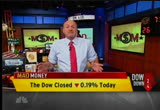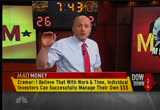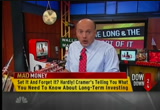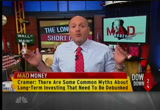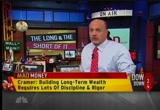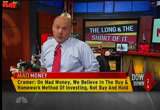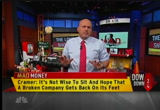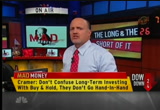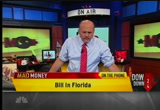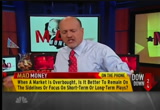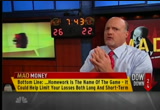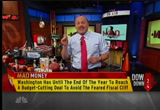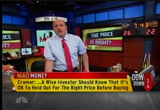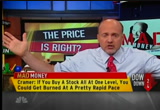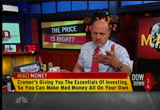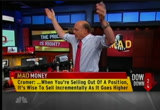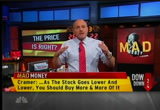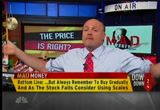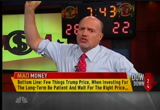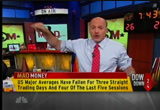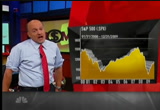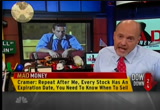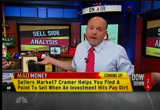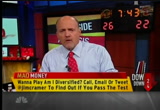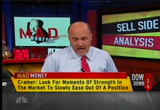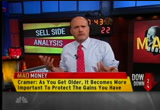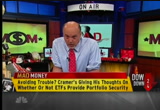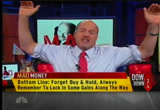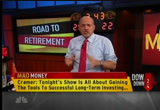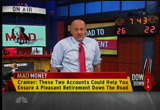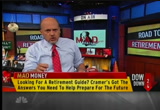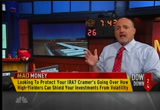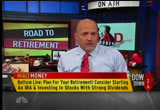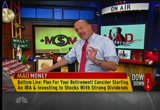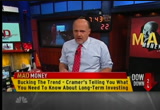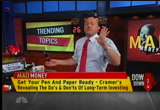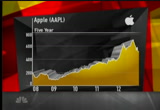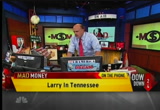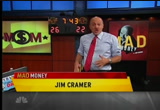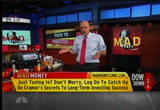tv Mad Money NBC December 27, 2012 3:00am-4:00am EST
3:00 am
>> and chili three different ways. >> have a great wines day wednesday, everybody. bye-bye. i'm jim cramer and welcome to my world. you need to get in the game. firms are going to go out of business and he's nuts, they're nuts! they know nothing! i always like to say there's a bull market somewhere. "mad money." you can't afford to miss it. hey, i'm cramer. welcome to "mad money." welcome to cramerica. other people want to make friends. i'm just trying to save you some money. my job is not just to entertain you but i'm trying to teach and coach you. so call me at 1-800-743-cnbc. in recent years stocks have become more hated, hated more than any time i can remember in my entire career. spans a lot of time! but you know what? i still believe anyone can turn a profit in the stock market, as long as you're willing to put in the time and the effort to keep track of what you own. i wouldn't come out here every
3:01 am
night to try to educate you if i didn't think it was not just theoretically possible but actually feasible for the vast majority of people to succeed at managing their own money. so if that's the case, then why is investing so darn difficult? how come so many people struggle to make money in the stock market? how the heck can i believe it possible for you to beat the averages, the big benchmarks, when so many people and fund managers fail to do so? simple. you can do it but you have to do it the right way. one of the biggest obstacles to successful investing is a lack of clarity about just what investing is supposed to mean. i have seen countless people try to follow the conventional wisdom about money management, only to have their investments wiped out because the conventional wisdom is wrong. and the worst part is those people had no idea they were
3:02 am
making a mistake. they actually thought they were being responsible. in other words, to borrow a phrase from "cool hand luke" -- >> what we've got here is failure to communicate. >> and i'm saying it boss. that's why tonight i want to demystify the concept of long-term investing, an idea that has been misinterpreted so often, in so many ways that it's become a hindrance more than a help. tonight i'm setting you straight. here we're about long-term investing but there's a serious problem with this notion that goes like this. too often people let the concept of long-term investing get in the way of investing. if you think long-term investing is about making boatloads of money over years, decades, a lifetime, that's something i can teach you how to do. however, there's a darker side to this concept. all too often i've seen people invoke long-term investing as an excuse, an alibi, either for poor performance -- >> the house of pain! >> -- or for not paying attention to what they own. you often hear you shouldn't worry about your losses or what you're losing in the present.
3:03 am
you'll make back the money with long term gains. sometimes absolutely true. but most of the time losing money month after month or year after year, that isn't a good recipe for making money over a long-term horizon. but long-term losses don't magically turn into long-term gains if you wait long enough. making money over the long haul is the ultimate goal in this game butch it's also become the alibi for short-term losses. that kind of thinking will only make you a worse investor, not a better one. before i can teach you how to invest for the long term, i have to disabuse you of all of the allegedly long-term alibis that you have been fed for ages. at what points do you need to cover your ears and tie yourself to the mast so that the you won't listen to the conventional wisdom and end up steering your portfolio on to the rocks? first and most important, long-term investing is not the same as simply owning stocks for
3:04 am
a long time. in other words, don't confuse being a good investor with the idiotic ideology of buy and hold, or as i dub it, buy and forget. this one bad idea has lost people more money than the last two financial crises combined. and just because you have a long term horizon and the losses are unrealized, it doesn't make them into gainers or even potential gainers. losses are losses, realized or otherwise. and the notion of being in something for the long term doesn't justify owning damaged goods. the stocks are in bad shape and will eventually recover? hey, damaged goods. the idea behind buy and hold is once you purchase your stocks, you just wait. me, i've never liked waiting and it also happens to be a terrible strategy. that's why i'm saying you have to keep track of your
3:05 am
investments. you have to do that ridiculously hard and time consuming homework. it's not that hard and you have to listen to the quarterly calls and much of the research that used to be available only in those paying millions of commissions are now found on the web, like yahoo! finance guide, cnbc.com, the street, they all got it. it's worth your reading. it's your money. please invest the time in it. the advocates of buy and hold act like you have a license not to pay attention to the short term. it's like you have a birthright. i can buy a stock and that allows me to not do homework. but you always have to pay attention. the moment you stop is the moment you stop losing money. you'll never be able to recover from those losses until you get engaged with your portfolio again. you're not stupid. you can get engaged and you can do this. sometimes companies go into what's known as secular decline and their stocks never recover. in that case you just have to get out before the damage
3:06 am
becomes too horrific. yes, polaroid, kodak, research in motion, nokia, how about radio shack. that was a good one, or supervalue. all the way down we were told long term you're fine or in other words, being a long-term investor doesn't give you a license to be a lazy and apathetic investors. ask anyone who owned stocks through the misery and horror of the crash in 2008 and 2009 knows it doesn't work. if there's one good thing the crash did, it disabused people of the idea you could buy and hold stocks to eternity. still, from the stories i read, and some pundits, the lessons are already being forgotten. i can't have that happen, not on my "mad money" watch. i've always opposed buy and hold. in this brave new world, many of the people who foolishly espouse this philosophy have tried to
3:07 am
change this tune. it doesn't mean write off the idea of long-term investing and that stocks can't make you money over an extended period of time, although that's what many of you might think if you confuse long-term investing with buy and hold investing. stocks are still the best way to make money for your retirement, 529 plan for education. especially stocks with dividends, the kind of dividend payers i highlight in getting back to even. that's good investing. you'll never get any of those things if you use long-term horizon as an excuse or alibi to hold them, something you won't know about if you buy and forget. here's the bottom line, long-term investing has gotten mixed up with a lot of bad ideas over the years. it doesn't mean it's impossible or not worth trying.
3:08 am
as long as you remember that saying, hey, come on, i'm a long-term investor is no excuse for not doing the homework or following the rules. in anything, being in stocks for the long term requires more diligence and more patience than if you're in there for the short term, so don't throw away all the lessons that i teach you. you're going to need them. to paraphrase that fabulous poetic amateur investor and world renowned beauty gertrude stein, a loss is a loss is a loss, unrealized or otherwise, and don't you forget it. bill in florida. >> caller: yes, jim. nice to talk to you. >> same. >> caller: i'm a retiree. i'm very concerned about the future. there's so much uncertainty, in taxes and inflation is a big concern of mine. is there anything i can do at my age to protect myself from all these uncertainties? >> you're a person who does have
3:09 am
to heed my 20% in gld and gold bullion. i think the defense is right to have. i'm not going to tell you to buy bonds that yield 2%. i think gold is going to be the best defense you have against the worries that you just outlined. let's go to anthony in virginia, please. anthony? >> caller: washington redskins booyah! rg3 nation stand up. >> dan snyder is your owner. have you thought about that at all? >> caller: i have a quick question. >> sure. >> caller: when the market is overbought, should i stay on the sidelines or go for the long-term? >> when it's overbought, my own rule is that we're plus five on the oscillator, if we're very overbought, hey, take a pass. another time will come. however, you can get started small and hope it comes back if you just can't resist. sam in ohio. sam.
3:10 am
>> caller: hey, jim. big glass city booyah to you. >> loving it. what's up? >> caller: i got a question. i've been looking at a couple utility stocks, looking at either going with preferred instead of the common shares. i wanted to get your opinion on what might be better. >> no, come on, man, we want upside. a lot of these utilities should have to be fabulous growth stocks, particularly in a growth economy. let's just own them outright, we'll do just fine. of course i want you in this market for the long run. you can't beat those high frequency traders. give me a break. i want long-term investing, but that does not mean buy and forget. for the long haul, do not throw out the rules. keep doing the homework. be sure that you're in the right merchandise and stay with cramer. >> doesn't miss a second of "mad money." follow @jimcramer on twitter. send jim an e-mail to
3:11 am
3:12 am
it's this amazing service that lets you watch as many tv episodes and movies as you want instantly. you watch on your tv through a game console or other devices connected to the internet. and it's only 8 bucks a month. start your free trial today. ♪ [ female announcer ] life is full of little tests, but bounty basic can handle them. in this lab demo, bounty basic is stronger than the leading bargain brand. everyday life? bring it.
3:13 am
bounty basic. now costs even less. everyday life? bring it. i played a round of golf.id in the last five hours? then i read a book while teaching myself how to play guitar; ran ten miles while knitting myself a sweater; jumped out of a plane. finally, i became a ping pong master while recording my debut album. how you ask? with 5-hour energy. i get hours of energy now -- no crash later. wait to see the next five hours.
3:14 am
let's talk the price is right. no, not the game show with bob barker. i'm talking about the stocks you have. if you want to make money from your stocks, it's critical that you buy them at the right price. that's true whether you're making short-term trades or purchasing something that if everything goes right you expect to hold for years and years. the price still matters. when you pay too much for a stock, you make it vastly more difficult to rack up the kind of gains that you and i want, the ones we can't get enough of here on "mad money." if you get the price wrong, you my not make anything at all. tonight i'm giving the power of price its due. so how do you find the best
3:15 am
price to pull the trigger given how important i think it is? when you're investing for the long haul, you have one huge advantage over people using a shorter horizon, a resource traders don't have the luxury of exploiting. i'm talking about time. as the longer term investor, you've got all the time in the world. when you want to buy a stock because you like the underlying company's prospects, and when there are no near term catalysts that could drive the share price up any time soon, that's a recipe for being patient. you don't have to pay the price the market is giving you at that very moment, you can be patient and wait for the stock to come down to your price before you do this. of course you're never going to get an all clear signal telling you that it's time to buy. so how exactly are you supposed to know how long you should wait before you pull that trigger? simple. no, don't know. this is where you have to embrace the theory of ignorance.
3:16 am
we don't know when a stock or market will give us the ideal time. most likely you'll get frustrated and then you'll dump the whole position a point or two down instead of using the weakness to buy more. i studied thousands of trades in my time. in short, there is no right price but if you build up your position in small increments, patiently picking up more shares over weeks and months, then you can avoid paying the wrong price. and that's more important. that's why back at my old hedge fund, you can follow along because i play with an open hand, not a lady gaga style poker face, i always like to buy with what's known as wide scales on the way down. authentic wall street jibberish. buying with wide scales on the way down describes the way to purchase a declining stock or stock that you're afraid is going to to go down in the stock market in general while it approaches the bottom.
3:17 am
this is the way to do it without getting discouraged. it's practically impossible to call a perfect bottom in an individual stock. i've rarely seen it. the odds of being wrong are too high. instead, the smart move, the way the pros do it and the way you should do it is to buy incrementally on the way down, and the big guy does this, believe me. it's your insurance against the potential bad judgment of thinking you know the stock is really done going down and you want to be all in because you're so darn sure that you're getting in on the ground floor. in this deal you have to assume there's a basement if not several subbasements. this helps you get around the difficulty of timing the market exactly and there's a trick. it's something i've used over time. say you want to buy 400 shares of caterpillar, saying it's trading at 90. if it trades down to 85, you're going to feel like a stooge. and worse, you'll have lost two grand in practically the blink
3:18 am
of an eye. that's why we don't do that. >> start small, maybe you buy 100 shares at 90. then you wait for a pullback. you have a better entry point. you buy the next hundred shares, if cat drops to say 81 and you put on the final hundred, if the stock sinks below 80, you know what, you got a pretty good basis. basis matters. basis is price. the worst case scenario, caterpillar goes higher and you make a little money. and when you decide to sell it, you should unload it incrementally into strength. but, oh, boy, i sold it all and then had it a big move. eliminate that thinking. now let's talk about scales. if you're buying a company that's sinking a little lower every day, it could be good because you can buy it with strict or wide scales.
3:19 am
what's the difference? if you are using strict scales, you would buy say a thousand shares of time, the stock loses a point. each time the essence of strict scales is you buy in the same increments. you purchase the same amount of stocks. using strict scales is smart and responsible. sometimes that's a problem. that's why i like to use wide scales. the trick with wide scales is you buy larger and larger positions as the stock goes lower. i used to think of it as a pyramid of buying. if the stock lost a point, i'd put on a thousand shares, another point, 1,500. when it's so low you can hardly believe it, you can double down. it's about a pyramid structure, all used pyramid style. scales is they leave you with the great thing about wide scales is they leave you with lots of room to maneuver. when the stock bottoms out, you
3:20 am
can accumulate a big position in that company's stock as it goes down. just make sure the story is still intact. you've got to do the homework. if the underlying company is broken, the stock is never going to be a bargain no matter how low it falls, which is why you need to do homework. you might need to abandon ship and find a better one to travel on. there is no sin in recognizing you made a mistake. be patient. keep your bat on your shoulder, wait for the right pitch, never buy all at once, and be sure to buy with wider scales to get the best possible overall basis. joe in massachusetts. joe. >> caller: hi, booyah, jim.
3:21 am
stop loss orders versus stop limits and how to use that not only to minimize the ups and downs. >> if you're going to own these and you're going to try to get the right prices, you have to stay on top of it. i'm sorry. it's too important. you get a stock flash. you buy the stock at 80 and suddenly -- it's too crazed. you have to protect yourself from this market. from any market that acts as badly and strangely. those old tricks out the window. price matters. don't buy all at once. keep an open mind. stay with cramer. [ dylan ] this is one way to keep your underwear clean.
3:22 am
this is another! ta-daa! try charmin ultra strong. it cleans so well and you can use up to four times less than the leading value brand. oh! there it is. thanks son. hey! [ female announcer ] charmin ultra strong has a duraclean texture that can help you get clean while still using less. and it's four times stronger versus the leading value brand. charmin ultra strong helps keep you and your underwear clean. we all go. why not enjoy the go with charmin ultra strong?
3:23 am
[ sniffs ] i took dayquil but my nose is still runny. [ male announcer ] truth is, dayquil doesn't treat that. really? [ male announcer ] alka-seltzer plus fights your worst cold symptoms, plus it relieves your runny nose. [ breathes deeply ] awesome. [ male announcer ] yes, it is. that's the cold truth! [ male announcer ] yes, it is. i played a round of golf.id in the last five hours? then i read a book while teaching myself how to play guitar; ran ten miles while knitting myself a sweater; jumped out of a plane. finally, i became a ping pong master while recording my debut album. how you ask? with 5-hour energy. i get hours of energy now -- no crash later. wait to see the next five hours.
3:24 am
3:25 am
you have saved my retirement. >> you are why i come out here and do this show. thank you so much. >> the stuff that you're doing for all of suss so important. thank you. >> my husband and i watch you every day. we count on your help for small investors like us. the only way to generate consistently strong returns year after year is by putting thought and effort into the process. it's like a personal trainer who promises that you can get in shape without doing any exercises, here's a pill. it doesn't work. yet i think a substantial majority of the public still believes this buy and hold nonsense is the only legitimate way to in vest. i read about it in the papers. no wonder stocks are so hated. people are convinced if they buy
3:26 am
blue chip stocks and they wait long enough, those stocks will work their way higher. that's some law of reverse gravitation. it's been a lousy strategy, if it's a strategy at all, if you can even call it that. but in recent years, let's just say it's been really horrific. think about it. for the last five years, the middle of 2007 and 2012, s&p declined by 9%. when you look at the benchmark's performance over the first decade of the new millennium, s&p was down 24%. though you only did lose 9% in those ten years when you factor in reinvested dividends, which is why i'm always telling you to own some high yield dividend stocks. even factoring dividends, you were better off hiding money in a mattress than buying and holding. the strategy didn't work. let me give you some advice that you almost never hear.
3:27 am
i want to talk about a forbidden term. some say it's a curse word. marks me as a charlatan. i want to talk about selling. selling. every stock you buy you should consider comes with an expiration date. again, radical. knowing when to sell those stocks is every bit as important as knowing when to buy the stocks. in fact, it's actually more critical because so many people make such a huge number of selling-related mistakes by panicking and selling into weakness or by getting greedy and not selling at all. if you pick the right stocks, eventually you're going to have some winners up and maybe up big. the trick at that point is not to go all in gordon gekko. greed is not good, man, it's dangerous, it's horrible. remember bulls make money, bears can make money, but pigs,
3:28 am
slaughtered. bacon. when you got a serious winner, even though it still has many years of gains left in it, i want you to take some profit, period. no discussion. the only time you're going to let your winners ride -- you can let some of them ride, but it's a mistake to let them all, you got to ring the register on some, a partial portion or position, otherwise your winners could become hunk winners. it's best to lock in profits while you still have them. you haven't really won until you've taken something off the table. hey, i'm making a lot of money. don't use that term making, unless you're profiting. ringing the register. why am i putting so much pressure on best performing stocks? you don't need me to tell you to sell your losers. when you own a stock and the
3:29 am
underlying company letyou down, maybe management isn't executing, maybe the economy takes a turn for the worse. don't get sentimental, don't give them the benefit of the doubt, you got to sell. better to act quickly and take a loss than giving the company a second chance to burn you. lots of people are waiting to get back to even before selling. it's the worst kind of amateur mistake. even then, these people know their losers deserve to be sold. they want to sell. they're just waiting too long for an unrealistic price that's too high given the downturn with the actual company. selling your losers makes perfect sense. selling your winners, though, is totally counterintuitive for many of you. you have to trim your winners. the first reason is simple -- diversification. say you owned a stock that's doubled and doubled and doubled. maybe you bought apple when it was trading around 200. it initially represented 15% of your portfolio. it's now a much larger piece of the pie. even if other stocks have gone up a decent amount. at that point you have too much exposure to even the single best stock and to whatever sector that stock is in.
3:30 am
you never want more than 20% in a sector. keeping all your eggs in one basket is downright dopey. that's why you need to trim your winners as they go higher, so they don't become too large a piece of your portfolio and get you in trouble. i'm not saying sell them all. if you're investing for the long term, you got time to do this and you do it gradually, pieces, not all at once. as your winners go higher, you should sell off parts of your position. scale out slowly over time. never sell all at once, just like you should never buy all at once, and wait for moments of strength. you don't want your portfolio to become too heavily weighted toward any one group. there's one more concept, and that's the idea of playing with house money. when you sell your best performers, it's the idea of playing with the house's money. when you own a stock that's had a huge multi-year run, you want to trim your position and all the money you have invested
3:31 am
comes from profits you already made and not a penny from the original investment. that's the holy grail of investing because you can't lose! you're in a can't lose position. you can ride it all you want. that's fine with me. that's bought and paid for. younger investors can afford to let those gains. simply cannot afford to risk turning big investing game over time. you got your whole working life. those of us in the older demographic, even if you're extraordinarily well preserved, like myself, you've got to be trimming your winners more aggressively and ringing the register more regularly. you can't just hold stocks forever. you have to remember to take profits, trim back your winners
3:32 am
so your portfolio stays diversified, and when you can, take all of the investment capital out and play with the house's money. >> caller: i was just wondering should we embrace etfs as a way to mitigate market volatility? >> the only etf i'd recommend on the show is the gld. why is that? because that's gold. i want to own the best. etf gives me the opportunity to own the worst with the best. i think what i've learned is to be able pick which ones are better and which ones are worse. i can teach you to do it and i know you'll do it. >> daniel. >> a big baylor bears booyah to you. while at baylor i was in a real management class.
3:33 am
so specializing in it, i started looking more toward the price and the precash flow to find a more valuable i.t. stock. >> i'll tell you, look, i happen to like the peg ratio but i look at myself when i'm analyzing a company that i want to be involved in. i look at operating cash flow. that's the one thing no one can really jigger. operating cash flow that is growing, to me that is a great way to measure the company's worth and its future. with apology to gordon gekko. the best you can be in is when all that's left is the profit that the market's given to you. stay with cramer!
3:37 am
if you want to invest for the long term, then like it or not that means planning for your retirement. in the long run, we all retire. it may not sound sexy but trying to put together enough money to become financially independent is really what we do every night here on "mad money." i'm sure you've heard the basics of retirement planning a billion times, you have to contribute to your individual retirement plan and your ira. instead of telling you to park money in your ira, i'm going to give you suggestions of what stocks to buy. everyone tells to you take advantage of your 401(k) or ira. it's because these are tax-blessed vehicles. you pay no taxes on your profits
3:38 am
so your investments can compound for years. you only pay taxes when you withdraw. that's a sweet deal. tax rates on dividends and capital gains do fluctuate over time. they've gone up and down throughout my career. i have to give you something radical here. something almost nobody else will come out and say. most companies' 401(k) plans stink. they have high management fees and administrative costs that eat into your returns and they offer you lousy choices for your investments. not nearly enough control. the 401(k) business is sometimes a racket for managers who get these large fees. i'm very upset about this but helpless to stop it. ideally you want a diversified portfolio of five to ten individual stocks. most 401(k) plans won't let do you that.
3:39 am
they let you choose from a very limited menu with some stock funds and bond funds. best you can normally do is find a low-cost index fund and put your money in there. you can do better by picking individual stocks and managing your portfolio on your own with your time frame. nevertheless, as much as some 401(k) plans stink, you should still contribute to your 401(k). these tax-favored vehicles are just too good to pass up. plus many employers will match your contributions. you should put enough money to max out the company match and if you have one and then stop. then the rest of your retirement
3:40 am
investing should happen in your ira. an ira gives you the freedom to invest your money whatever way you want. the maximum contribution was $5,000, and $6,000 if you were over 50. your best bet here is to own many of the high yielding stocks i talk about all the time on this show that provide the protection and generate income. a couple of wrinkles that make investing in ira different from a regular fund. it doesn't work well for master limited partnerships. mlps are already tax advantaged. the distribution is considered a return of capital. but there's this arcane tax rule, if you buy too many of these stocks within a retirement account, you could give up the tax favored status and pay taxes you wouldn't have paid in a
3:41 am
regular brokerage account. in general we do tend to have notes worth high yields. you have to be careful with the mortgage reits. that's the group you want, but you got to consult your tax professional about mlps and real estate investment trust. otherwise we go to the utilities and telcos. looking for high yields, the company better have enough earnings to cover the payout. we like companies with a consistent record of raising their dividends. the bottom line, a huge part of long-term investing is retirement investing. reinvest your dividends without paying taxes. that's a terrific recipe for producing huge long-term returns.
3:42 am
>> hi, jim. do you record only questions so sometimes i do it in realtime, a lot of times i do it in the show. i do the transcript on the way home and the transcripts are readily available everywhere. you can stop and think. you can't do that when you're listening live. reinvest, build up over time, avoid the taxes by making sure you make the contributions every year. stick with cramer.
3:43 am
[ woman #1 ] i can't believe it's finally here! [ woman #2 ] it's the real deal! [ man #1 ] turn it around! turn it around! [ woman #1 ] over here! over here! [ woman #2 ] turn around! turn around! [ woman #1 ] i love you! i can't believe it's not butter! neither can i. turn the tub around! show us the back! [ man #1 ] turn the tub around! [ female announcer ] with zero grams of trans fat per serving, i can't believe it's not butter is a superstar! ♪ turn the tub around, and become a believer.
3:44 am
i have a cold, and i took nyquil, but i'm still "stubbed" up. [ male announcer ] truth is, nyquil doesn't unstuff your nose. what? [ male announcer ] it doesn't have a decongestant. no way. [ male announcer ] sorry. alka-seltzer plus fights your worst cold symptoms plus has a fast acting decongestant to relieve your stuffy nose. [ sighs ] thanks! [ male announcer ] you're welcome. that's the cold truth! [ male announcer ] alka-seltzer plus. ♪ oh what a relief it is! ♪ [ male announcer ] to learn more about the cold truth and save $1 visit alka-seltzer on facebook.
3:47 am
>> here's a serious conundrum. how are you supposed to pick stocks for the long haul when sectors are constantly going in and out of style on the wall street fashion show? how do you buy something with an eye to racking up gains when that's not how it works anymore. when you find them they are the holy grail of investing. and those don't go in and out of vogue, to stick with the fashion show analogy. all right, like i told you before, there's no such thing as a stock you can own forever. that's the essence of the kind of buy-and-hold thinking that's lost so many people such huge
3:48 am
sums of money over the years. but some winners are more lasting than others and there's a certain type of stock that can produce incredible multi-year gains, and they can be owned for much longer than what i regard as ordinary stocks. i'm talking about what's known as secular growth stocks, that's a rare breed that you should always be on the lookout for. these companies are driven by powerful long-term stories that transcend the economy. most companies need a healthy economy in order to thrive. we call that cyclical growth. how do you spot a genuine secular growth name? i like to look for big picture themes. we have a company that plays on a much broader trend. take the move toward healthy eating and embrace of organic foods. this has made whole foods into a powerhouse stock and it's also destroyed the regular
3:49 am
supermarkets and the same for hain celestial. however, while these stories can last for years, even secular growth trends have a limited shelf life. there are fewer and fewer plays that can consistently make you money. last longer but never just last forever. years ago back when the smartphone was a relatively recent invention, i started talking about the power of the mobile internet tsunami. for a while there was a ton of money to be made over the smartphone food chain. but the tsunami turned out to be not a license to buy even the sector's weakest players, which gradually fell by the wayside. the rising tide does not lift all ships. most of the time can you hang on to a stock for years and years
3:50 am
but if you find a secular growth story, driven by the same theme pushing up a whole foods or apple, there's nothing wrong with owning these super high quality stocks for as long as the story stays intact because they're not going to be part of the wall street fashion show. but just like life, even secular growth stocks don't last forever. even the biggest wave winds up crashing on the shore. only homework will keep you from crashing along with it. larry in tennessee, larry. >> caller: is this james j. cramer? >> yes, it is. how are you? >> caller: great, man. i think i've read everything you wrote since 1998. i wanted to call and thank you for helping me put my daughter through college and teaching us home gamers how to survive in this stuff. >> you're terrific. thank you. >> caller: i have a question. tax season is coming up and you teach us to trade around the core positions up and down.
3:51 am
i wonder if you have any advice for us coping with wash sales. >> wash sales are a problem. what i'm going to do on that question is i am going to tell people because i can't give individual tax advice, you got to speak to your tax consultant about when you can take these sales and then go back and buy. you're absolutely right, there can be a wash sale problem. no stock is forever. they come in and out of fashion all the time but some do last longer than others. those are the secular stories we live for. they have a longer shelf life and that's ultimately what we're trying to find. so, we all set? i've got two tickets to paradise! pack your bags, we'll leave tonight. uhh, it's next month, actually... eddie continues singing: to tickets to... paradiiiiiise! no four. remember?
3:52 am
whoooa whooaa whooo! you know ronny, folks who save hundreds of dollars by switching to geico sure are happy. and how happy are they jimmy? happier than eddie money running a travel agency. get happy. get geico. fifteen minutes could save you fifteen percent or more. anyone have occasional constipation, diarrhea, gas, bloating? yeah. one phillips' colon health probiotic cap each day helps defend against these digestive issues with three strains of good bacteria. approved! [ phillips' lady ] live the regular life. phillips'. i have a cold, and i took nyquil, but i'm still "stubbed" up. [ male announcer ] truth is, nyquil doesn't unstuff your nose. what? [ male announcer ] it doesn't have a decongestant. no way. [ male announcer ] sorry. alka-seltzer plus fights your worst cold symptoms
3:53 am
plus has a fast acting decongestant to relieve your stuffy nose. [ sighs ] thanks! [ male announcer ] you're welcome. that's the cold truth! [ male announcer ] alka-seltzer plus. ♪ oh what a relief it is! ♪ [ male announcer ] to learn more about the cold truth and save $1 visit alka-seltzer on facebook.
3:54 am
all night i've been trying to walk you through what it does and doesn't mean to be a good long-term investor. while we're on the subject, i got one last point i need to make. there's nothing inherently virtuous about long-term investing. don't get too hung up on the nomenclature. the notion of trading is loaded with negativity.
3:55 am
i'm not making any judgments, all right? we're here to make money. i happen to think picking long-term winners is more lucrative than gaming short-term stock moves and it's easier for you at home to duplicate, so i like it. if you're finding your portfolio does better more actively, hey, more power to you. i'm not going to judge you, although never forget, you do not have the horses to compete with the high frequency funds or hedge funds with multi-million dollar research budgets to support their trading investments. at the end of the day, the banks don't care whether your money was made from long-term investments or or not. the teller, presuming you can find a human, isn't going to say i can accept this deposit but not that one, that's dirty money from trading, take it elsewhere. money's money. the only money worth making is the kind that came from staid, boring investing. the only difference in trading
3:56 am
and investing has to do with your time horizon. trades are short term. investments are positions you plan on being in for longer, a year, year and a half. day trading is totally different. i can't encourage day trading because i think you'll lose money. don't be fooled by the false dichotomy. you don't have to choose between passively sitting on your holdings as an investor, even when you feel like you should really be taking action. look, you can do what you need to do to save money. find your own happy medium, no matter which path you choose or both, be true to your disciplines, stay on top of things and you'll do better than just about any hedge fund can you have at your disposal. stick with cramer. i played a round of golf.id in the last five hours?
3:57 am
then i read a book while teaching myself how to play guitar; ran ten miles while knitting myself a sweater; jumped out of a plane. finally, i became a ping pong master while recording my debut album. how you ask? with 5-hour energy. i get hours of energy now -- no crash later. wait to see the next five hours. it's not for colds. it's not for pain. it's just for sleep. because sleep is a beautiful thing™. ♪ zzzquil™. the non-habit forming sleep-aid from the makers of nyquil®.
3:58 am
3:59 am
133 Views
IN COLLECTIONS
WBAL (NBC) Television Archive
Television Archive  Television Archive News Search Service
Television Archive News Search Service 
Uploaded by TV Archive on

 Live Music Archive
Live Music Archive Librivox Free Audio
Librivox Free Audio Metropolitan Museum
Metropolitan Museum Cleveland Museum of Art
Cleveland Museum of Art Internet Arcade
Internet Arcade Console Living Room
Console Living Room Books to Borrow
Books to Borrow Open Library
Open Library TV News
TV News Understanding 9/11
Understanding 9/11
